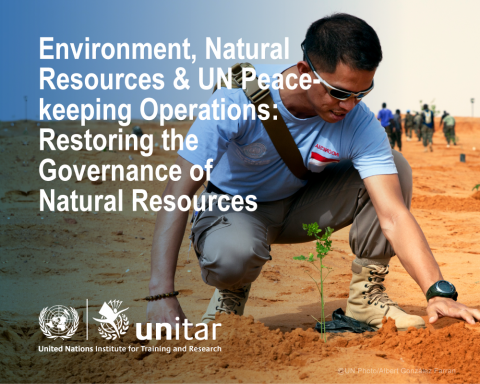
UNITAR Online Catalogue
Environment, Natural Resources and UN Peacekeeping Operations: Restoring Governance of Natural Resources [PTP.2024.08E]

和平
背景信息
Over 20% of the world’s population currently lives in conflict affected areas and fragile states. In many of these places, natural resources and their governance play a key negative role in both the conflict and the fragility. In fact, since 1990 at least 18 violent conflicts have been fuelled by the exploitation of natural resources. At the same time, good governance of natural resources can provide a solid platform for post-conflict reconstruction and peacebuilding. Addressing conflicts where natural resources play an important role has also been one of the difficult challenges faced by the UN peacekeeping operations and the UN Security Council. Since 1948, a quarter of all peacekeeping operations, representing half of the total peacekeeping budget, have been deployed to address conflicts with clear links to natural resources. While UN’s response to these conflicts has improved over the decades, the 2012 UNEP report Greening the Blue Helmets: Environment, Natural Resources and UN Peacekeeping Operations identified a number of opportunities for improved implementation of peacekeeping mandates and the ways in which peacekeepers can capitalize on the peacebuilding potential of natural resources. The findings of this report form the basis of this training module.
活动目标
The main objective of this training program is to raise awareness about the links between natural resources, conflict, peacekeeping and peacebuilding among relevant peacekeeping staff and those working on planning, drafting and monitoring of implementation of peacekeeping mandates.
学习目标
By the end of this module, the user should be able to:
- Explain the links among natural resources, environmental change, conflict and peacebuilding;
- Describe how natural resources have been integrated into the UN’s peace and security work;
- Describe the components of and tools for good natural resource governance;
- Identify how peacekeepers can help restore the governance of natural resources in post-conflict societies.
内容和框架
The course is broken down into five main sections:
- Section 1 – Introduction to key concepts and definitions.
- Sections 2 and 3 - Review of the linkages among natural resources and conflict and peacebuilding, respectively.
- Section 4 – Outline of how natural resources considerations have been integrated into UN peace and security operations.
- Section 5 – Review of what peacekeeping operations can do to address the governance of natural resources in conflict-affected and post-conflict societies.
The course approximately takes 2-3 hours to complete.
方法
The course is self-paced. Content is presented through interactive slides, videos, maps and graphs. The learners will be assessed based on a quiz at the end of the course.
目标受众
This module is particularly targeted at peacekeepers dealing with natural resource related issues including but not limited to: civil and political affairs officers, JMAC (joint mission analysis cell), CIMIC (civil-military coordination), J5 (joint planning branch), staff officers, DDR components, decision makers at headquarters, and anyone else who needs detailed awareness of the risks and opportunities posed by natural resources in peacekeeping. For general awareness of the topic and to get a foundation of the topics discussed in this Module, we recommend interested participants to take Module 1 of this training programme titled, Introduction to Environment, Natural Resources and UN Peacekeeping Operations.
更多信息
Copyright
This training module was developed by UNEP’s Post-Conflict and Disaster Management Branch in collaboration with UNITAR and the International Institute for Sustainable Development (IISD).
For administrative queries, contact ptp [at] unitar.org (ptp[at]unitar[dot]org)
Certificates of completion will be sent to participants, upon the successful completion of the end-of-course quiz and after participants have filled out the course evaluation form.
Technical Requirements
UNITAR recommends the following as a minimum in hardware and software to take our e-Learning courses. Please consult your Network Administrator or Systems person to ensure that you have the following:
Hardware requirements
- Desktop or laptop computer with Windows 10 or MacOS version 11 and later
- Tablet or mobile devices are not fully supported on some course tools
- Stable LAN or Wifi Internet connection
Browser
- Latest version of Mozilla Firefox (download for free at https://www.mozilla.org)
- Latest version of Google Chrome (download for free at https://www.google.com/chrome)
- Microsoft Edge or Safari (included in your computer)
Other software
- PDF reader (download for free at https://get.adobe.com/uk/reader)
- Microsoft Office for Windows or MacOS (compatible software can be downloaded at http://www.openoffice.org/)
- Video player (Quicktime for MacOS, Windows Media Player or compatible video player)
- Anti-virus
Other requirements
- Disable Pop-up blockers
- Enable cookies and java
- webcam and audio headset for courses that will require online meetings
- additional storage in case you need to download course materials
You will receive an email with all the detailed information on how to access the course within 48 hours from the registration. Please kindly check your spam or junk inbox.